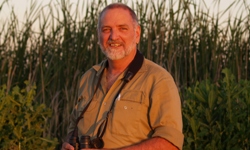Getting communities involved is crucial to the success of the Murray Darling Basin Plan. That's the message Charles Sturt University (CSU) wetlands expert, Professor Max Finlayson, will deliver at the Australian Regional Development Conference.
 Professor Finlayson,
who is Director of the University's Institute for Land, Water and
Society, will present a keynote address at the conference in
Albury on Wednesday 15 October.
Professor Finlayson,
who is Director of the University's Institute for Land, Water and
Society, will present a keynote address at the conference in
Albury on Wednesday 15 October.
He said Australia's management of the huge Murray Darling Basin is unique, demonstrating extraordinary collaboration across jurisdictions and regions for the wise allocation of a limited resource – water.
"We have a plan, backed by legislation, to collaborate in the use of this limited resource, and the world is looking carefully at what we do next," Professor Finlayson said.
"The plan promises to equitably meet the needs of multiple and diverse stakeholders. The risk we now face is that the plan could falter unless there is enough 'buy-in' from the 'bottom-up', particularly from local communities.
"We need communities to be involved and recognised, and it needs to happen now and far into the future."
Professor Finlayson developed ideas for the address, titled Supporting Dynamic and Sustainable Socio-Environmental Systems: Realities, Challenges and Opportunities with the Murray-Darling Basin Water Plan, with ILWS research fellow Mr Peter Waterman, and Mr Ashley Bland, the manager for sustainability with Skillset, Flannery Centre, Bathurst, NSW.
Professor Finlayson believes that to involve communities, the Plan requires indicators that these communities can associate with and understand.
"We need the correct indicators for measuring success, not only to measure progress and government efforts, but also to encourage communities by delivering these results effectively to local communities. This needs functional communities and research networks.
"The Basin Plan is about water, and the Plan needs to answer a complex and critical question: 'How do we create thriving, vibrant regional communities through the equitable distribution of such a limited resource?' Any credible answer to this question must include all the people and groups involved.
"We understand that we'll never manage it all but we can empower people to make it work. Therefore, we emphasise the all encompassing aspects of the question and this limitation."
Professor Finlayson said that research is needed to assist with the implementation of the Plan.
"Research is needed to learn from the implementation, for the sake of our communities and our environment. This is important for Australia and globally," he said.





Social
Explore the world of social